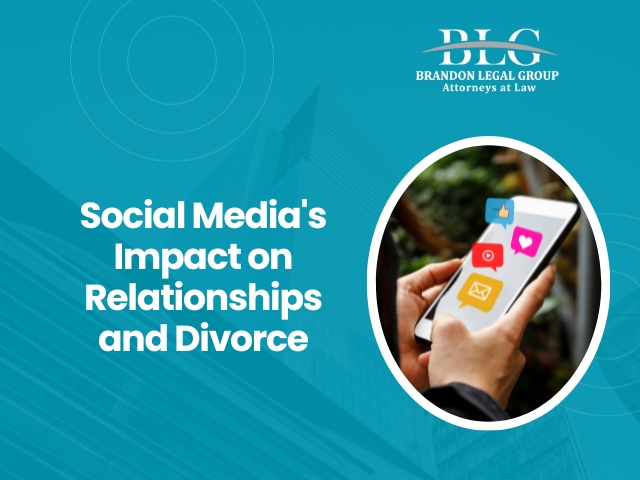In today’s social media-driven world, its influence extends into every part of our lives, including our relationships. The rise of platforms like Facebook, Instagram, and Twitter has altered the way couples interact, sometimes leading to marital issues. We’ll discuss six key areas to understand how social media influences divorce, illustrated with fictional examples.
Online Infidelity’s Lure
Social media provides a breeding ground for temptation and has made infidelity more accessible than ever before.
The following is a DRAMATIZATION, NOT AN ACTUAL EVENT: For instance, in a made-up story, Jane and John, a married couple, face troubles. Jane’s chats with an old friend on Facebook turn into an emotional affair. This secret online connection can lead to emotional withdrawal and marriage breakdown.
The Pitfall of Unrealistic Expectations
Perfect-looking lives on social media can make people unhappy with their own. In another fiction, Sarah feels unhappy in her marriage by comparing her life to ideal images on Instagram. Such comparisons can lead to dissatisfaction and potentially end a marriage.
The following is a DRAMATIZATION, NOT AN ACTUAL EVENT: For example, a fictional person, Sarah, becomes disillusioned with her marriage when she constantly reaches her spouse to the seemingly perfect couples she follows on Instagram. Such comparisons can foster discontentment and ultimately contribute to the breakdown of a marriage.
Cyberbullying’s Strain on Marriage
Social media can also be a platform for cyberbullying, adding stress to marriages. Imagine Jane and John’s relationship worsening due to online harassment. Public shaming and hurtful comments can cause deep emotional pain and possibly lead to divorce.
Addiction to Digital Worlds
Being too attached to social media can neglect real relationships.
The following is a DRAMATIZATION, NOT AN ACTUAL EVENT: In a fictional scenario, Joe’s marriage to Anna fails because he spends more time on social media than with her. This addiction can create a disconnect and erode trust and closeness in a marriage.
Invasion of Privacy and Trust Issues
Social media can blur personal boundaries, causing privacy and trust issues in relationships.
The following is a DRAMATIZATION, NOT AN ACTUAL EVENT: For example, Tom and Laura’s marriage faces problems when Laura finds out Tom has been secretly checking her social media. Such invasions of privacy can destroy trust and lead to the end of a relationship.
Social Media as Divorce Evidence
The digital traces on social media can significantly affect divorce proceedings.
The following is a DRAMATIZATION, NOT AN ACTUAL EVENT:For instance, in a fictional case, Lisa uses Mike’s social media posts showing his irresponsible behavior as evidence in court, impacting child custody and asset division decisions.
Guidelines for Navigating Social Media During Divorce
Divorce is hard for both partners and children. In the social media age, it’s important to be cautious online during this sensitive time. A divorce attorney can offer advice on social media use to protect one’s interests in a divorce.
Advice for Partners
It is crucial to refrain from using social media as a platform to vent frustrations, share harmful or sensitive information, or engage in online arguments. Keep your posts respectful and private. Change privacy settings to control who sees your personal information and avoid posting about new relationships or financial matters.
Protecting Children’s Privacy
Children can find divorce especially hard. Parents should keep their children’s emotional well-being in mind on social media. Don’t discuss the divorce or criticize the other parent online. Monitor your children’s social media use and talk openly about their online experiences.
Finding Support Online
Online support groups or forums can be helpful. They offer a place to share experiences and get emotional support from others in similar situations. These connections can provide valuable advice and reduce feelings of isolation.
- A safe space for sharing experiences
- Seeking advice
- Receiving emotional support from others who have gone through similar situations.
- Connecting with individuals who have navigated divorce successfully can offer valuable insights and help reduce feelings of isolation.
Limiting Social Media Use
Too much social media during a divorce can be harmful. Set limits on use and create times or places free from social media. This can help focus on healing and important parts of the divorce process, like legal discussions or therapy.
Seeking Professional Help
Divorce is complex, and professional help is often needed. Therapists, counselors, or mediators specializing in divorce can help manage emotions and offer strategies for communication and co-parenting.
Emphasizing Real-Life Connections
During a divorce, it’s crucial to focus on offline activities and relationships. Encourage hobbies, spend time with loved ones, and explore new interests. This can help in finding comfort and rebuilding a support network outside of social media.
Conclusion
We must address the role of social media in divorce in our digital world. Open communication, setting boundaries, and being aware of social media’s pitfalls can help maintain healthier relationships. Balancing our online and offline lives is key to preserving our relationships in the digital age.
